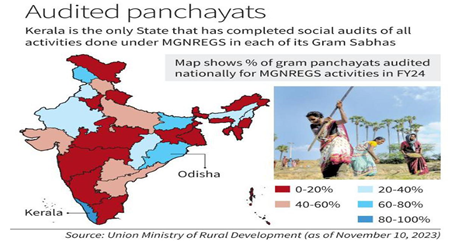

24th November 2023 (7 Topics)
Context:
Lack of compliance and fulfillment of Social Audit as part of the MGNREGA initiative.
The mandate of MGNREGA for Social Audit
- Section 17 of the Mahatma Gandhi National Rural Employment Guarantee Act (MGNREGA) says the gram sabha “shall monitor the execution of works”.
- Each State has social audit units which are supposed to work independent of the implementing authorities.
- The auditing standards laid down by the Comptroller and Auditor General were issued only on December 19, 2016.
- Every Social Audit Unit is entitled to funds equivalent to 0.5% of the MGNREGA expenditure incurred by the State in the previous year.
- The audit involves quality checks of infrastructure created under the MGNREGA, financial misappropriation in wages, and checking for any procedural deviations.
Reasons for lack of Compliance
- High rate of corruption is one of the primary complaints against the scheme and social audit is the inbuilt anti-corruption mechanism in the Act.
- Lack of Functional Social Audit Teams
- Lack of Training and capacity building of Teams
- Lack of awareness about social audit.
- Ritualistic nature of the social audit process.
- 5% of the MGNREGA is too little for the Process.
The numbers and all pervasive Problem
- Other than Kerala the only States to cross the 50% mark are Bihar (64.4%), Gujarat (58.8%), Jammu and Kashmir (64.1%), Odisha (60.42%) and Uttar Pradesh (54.97%).
- Only three States have covered 40% or more villages — Telangana (40.5%), Himachal Pradesh (45.32%) and Andhra Pradesh (49.7%).
- Other than Telangana, among the poll-bound States, the numbers are really low — Madhya Pradesh (1.73%), Mizoram (17.5%), Chhattisgarh (25.06%), and Rajasthan (34.74%).
- The problem is uniform irrespective of the party in power across the country.
- Social audit is the inbuilt anti-corruption mechanism in the Act.
(Statistics are sourced from the Management Information System (MIS) on Social Audit maintained by the Union Ministry of Rural Development (MoRD) as on November 10. )
Concept: Social Audit
- Social Audit is the examination and assessment of a programme/scheme conducted with the active involvement of people and comparing official records with actual ground realities.
- Social Audit is a powerful tool for social transformation, community participation and government accountability.
- Social audits are conducted in partnership with civil society organisations, with auditors emerging from among scheme beneficiaries, who are trained over a period of time on how to conduct a social audit.
- Since awareness generation is an important component of these audits, it becomes necessary to have conduits that can be relied upon to transfer factually correct information.
Mechanisms of Social Audit
- The Department of Rural Development in states like Andhra Pradesh, Telangana and Meghalaya has set up its Society for Social Audit and Transparency which are autonomous institutions that conduct social audits of the MGNREG Scheme.
- This is in furtherance of the Social Audit Manual of the Ministry of Rural Development which requires every State to set up an independent Social Audit Unit consisting of resource persons from the State, District and Village as well as experts on relevant themes.
- Other related Initiatives: The Meghalaya Community Participation and Public Services Social Audit Act, 2017.
- Meghalaya became the first state in India to operationalize a law that makes social audits of government programmes and schemes a part of government practice.
Centre-State and Social Audit
- The Centre has, multiple times, reminded the States that if the social audits are not conducted regularly, then the funds under the MGNREGS will be withheld.
- The States complain that the audit is delayed because the Centre does not release the funds for the social audit units, which work independent of the State governments, in time.
- There are recurrent complaints of delayed salaries for the village-level auditors.
Silver Lining
- Kerala is the only State to cover 100% gram panchayats.
- State holds periodic Social Audit Public Hearings (Janakeeya Sabhas) at the panchayat level to subject the audit reports to close public scrutiny.
The goal of deepening of democracy and democratic decentralization will continue to remain a pipe dream till initiatives like Social Audit are implemented in letter and spirit.
More Articles


